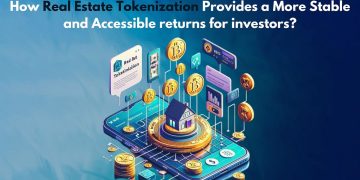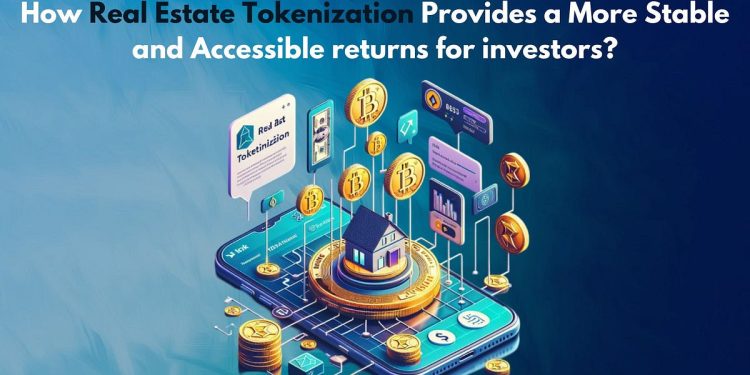In recent years, the investment environment has evolved dramatically with the rise of blockchain technology. One of the most exciting developments is the tokenization of real estate, which combines the security of traditional real estate investments with the flexibility and accessibility of digital assets. This new model offers investors more stable and accessible opportunities, potentially changing the way people think about real estate investments. Here, we’ll explore how real estate tokenization provides these advantages, from democratizing access to the market to offering greater liquidity and reducing risks.
Real estate tokenization refers to the process of creating digital tokens on a blockchain that represent ownership or shares of a real estate asset. These tokens are backed by tangible properties, such as residential, commercial, or industrial real estate. Blockchain technology allows these tokens to be traded, transferred, and verified securely, ensuring transparency and reducing the need for intermediaries like banks or brokers.
Traditionally, investing in real estate required significant capital, time, and effort, with many people excluded from the market due to high barriers to entry. Tokenization breaks down these barriers, providing new ways for investors to access and participate in real estate opportunities. But how exactly does tokenization make real estate investments more stable and accessible?
One of the primary reasons real estate tokenization offers a more stable investment opportunity is that it is directly tied to physical real estate assets. Unlike cryptocurrencies or other speculative digital assets, tokenized real estate is backed by something tangible, such as a commercial property, residential unit, or land. This real-world asset backing ensures that the value of the token is more stable and grounded in the value of the underlying property.
While the real estate market can experience fluctuations, it tends to be less volatile than other investment sectors, such as stocks or digital currencies. Properties, especially those in prime locations, often appreciate over time, providing long-term value for investors. Tokenization allows investors to tap into this value while benefiting from the stability inherent in real estate. Since tokens represent fractional ownership of physical properties, their value is tied to the property’s performance, including rental income, property appreciation, and any value-added improvements.
Real estate is traditionally considered an illiquid asset. Selling a property can take months or even years, and the transaction costs associated with buying and selling real estate are often prohibitive. Tokenization, however, brings a revolutionary shift by making real estate assets more liquid. Digital tokens can be bought and sold on secondary markets, providing greater availability for investors. As a result, tokenized real estate offers an unprecedented level of flexibility, allowing investors to exit or enter the market quickly and efficiently.
Moreover, tokenization allows for fractional ownership, which is crucial in reducing entry barriers for new investors. In traditional real estate investments, purchasing a property often requires significant capital, making it inaccessible to many people. With tokenization, real estate assets can be divided into smaller units or shares, allowing investors to buy fractions of properties for as little as a few hundred or thousand dollars. This fractionalization democratizes access to real estate investments, giving a broader range of individuals the opportunity to participate.
Transparency and security are two of the most significant advantages of real estate tokenization. Blockchain technology ensures that every transaction is recorded on a decentralized ledger that is accessible to all participants, providing a transparent view of ownership and transaction history. This reduces the risk of fraud or manipulation, making the entire process more secure and trustworthy.
In traditional real estate investments, the process can be opaque, with various intermediaries involved, such as brokers, lawyers, and banks. Each party may have its own records and systems, leading to a lack of transparency and an increased risk of errors or fraud. Tokenization removes many of these intermediaries, streamlining the process and creating a clearer, more efficient path to investment.
Moreover, blockchain’s security features, such as encryption and immutability, ensure that tokens cannot be altered or tampered with, providing an additional layer of protection for investors. This security is especially important in the real estate market, where large amounts of money are involved, and ensuring the integrity of transactions is crucial.
Tokenization opens up new opportunities for portfolio diversification. Real estate has always been considered a stable asset class, but owning a single property can expose investors to risks such as market downturns, property-specific issues (e.g., maintenance, vacancy), or local economic conditions. Tokenization allows investors to diversify their holdings across different properties, regions, and types of real estate. For instance, an investor can own a small share in multiple properties, spreading their risk across different markets and sectors.
This diversification can help mitigate the risks associated with traditional real estate investing, as investors are not reliant on the performance of a single asset. Tokenization also allows for diversification across different types of properties, such as commercial, residential, or industrial, giving investors the flexibility to choose investments that align with their risk tolerance and financial goals.
Real estate tokenization is not bound by geographical borders. Blockchain technology enables the creation and transfer of tokens on a global scale, meaning that investors from anywhere in the world can participate in real estate markets. This global access is a major advantage for both investors and developers. Investors can diversify their portfolios by investing in properties located in different countries or regions, potentially benefiting from different economic conditions and market cycles. Developers, on the other hand, can tap into a global pool of investors, raising capital for projects without being limited by local markets.
Additionally, tokenization provides developers with an efficient way to raise capital, as they can issue tokens to investors and offer ownership stakes in their projects. This broadens their access to funding and accelerates the development process.
While real estate tokenization is still an emerging concept, regulatory frameworks are starting to take shape. Governments and financial regulators in various countries are beginning to recognize the potential of blockchain technology and are working to create clear guidelines for tokenized assets. This regulatory clarity helps ensure that tokenized real estate investments are compliant with existing laws and that investors are protected.
The legal framework for tokenization also helps establish clearer ownership rights, reducing the risk of disputes and misunderstandings. With tokenization, ownership of the real estate asset is recorded on the blockchain, and the distribution of profits or rental income can be automated through smart contracts, ensuring fairness and transparency in the process.
Real estate tokenization is changing the way people invest in real estate, offering a more stable and accessible investment opportunity. By breaking down traditional barriers to entry, providing fractional ownership, enhancing transparency and security, and offering greater liquidity, tokenization makes real estate investment more attractive to a broader audience. With the ability to diversify portfolios, access global markets, and benefit from the stability of real estate, investors now have a new avenue to build wealth in an asset class that has long been considered a cornerstone of financial security.
As the technology matures and regulatory clarity continues to improve, real estate tokenization is poised to become a mainstream investment vehicle, democratizing access to real estate and creating a more inclusive and efficient market for everyone involved.











